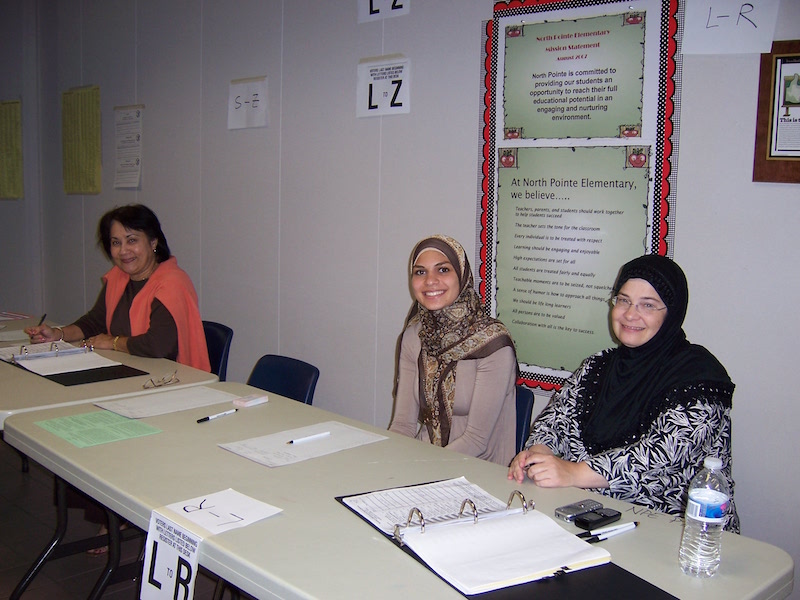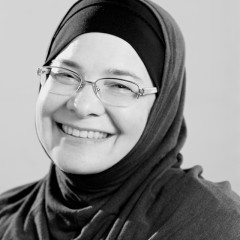
Ruth Nasrullah, right, sits next to Maha Khalil, center, at her Houston voting precinct. Photo courtesy Mohammed Nasrullah
HOUSTON (RNS) For the last 12 years I have worked as an election clerk in my precinct, which has about 4,300 registered voters. I greet voters, confirm their registration status and send them to the booth.
My precinct is about 4 square miles in size, so the voters are my neighbors. I don’t know all of them and I’m not privy to their voting preferences. My southeast Houston neighborhood, like most of Texas, is majority Republican and one of our U.S. senators, Ted Cruz, won the state’s March GOP primary. In Texas, party registration is not required, so voters are free to vote in either party’s primary.
The Republican and Democratic polls are set up on opposite sides of the gym in a local elementary school. On Super Tuesday, I worked the Democratic polls, and given the Republican majority, I spent a fair amount of time idle, except for watching the long lines of people waiting to vote on the Republican ballot.
Observing my neighbors, I wondered who among them had the heart and mind of a Trump supporter and what they thought of me. We read a lot about the angry blue-collar voters who support Trump; my part of Houston has a diverse population, racially and ethnically.
Maybe in my precinct I would find an answer to the question: What drives someone to support Trump other than anger over “political correctness”?
READ: The true Islamic response to the Brussels attacks (COMMENTARY)
Knowing the answer is critical in a presidential primary marred by explicit suspicion of Muslims.
After Cruz’s reaction to the attacks in Brussels this week, I’ve been wondering who among my neighbors would support his call “to empower law enforcement to patrol and secure Muslim neighborhoods before they become radicalized.”
Parse that sentence to find its meaning.
What is a “Muslim neighborhood”? How many Muslims must live in a designated area to qualify it as Muslim?
Does “patrol” mean unmarked police cars driving slowly past mosques? Does “secure” mean to delineate boundaries in which Muslims can live or work or shop or worship?
The meaning of “before they become radicalized” is clear. It implies that all American Muslims will eventually commit or support acts of terror.
This primary season has been tainted by the darkest of principles the Republican Party can muster. Plans to secure and patrol people of an identified race or religion are the tip of that slippery slope that leads us back to interning of Japanese-Americans and restricting of Jews to ghettos.
Clearly, we are far from those extremes, but if every terrorist incident prompts a call for banning, spying on or registering Muslims in this country, the comparison becomes more valid. We have to stay off that path.
I am especially worried by Trump’s comments about Muslims, which have gotten more virulent since the Brussels terror attacks. He has reiterated his ban on Muslims, repeated his call for a wall along the Mexican border and renewed his support for torture of suspected terrorists.
READ: Brussels attacks: How radicalization happens
A couple election cycles ago, several clerks who wear the hijab staffed the Democratic precinct election table. A gentleman came in to vote, scanned the table, scoffed and said, “I thought you had to be a citizen to vote,” implying that wearing a headscarf and long skirt made it unlikely that we were American.
In an angry voice he then suggested they shop at the Gap. (Ironically, one of the young women was actually wearing clothes she bought there.)
Gov. John Kasich, the only Republican candidate with a moderate response to the Brussels attacks, stated that we are at war with radical Islam, not Islam. I appreciate his moderation, but I don’t agree that we are at war with a religion. We are at war with extremists. We are not necessarily capable of determining if they are Muslim.

Ruth Nasrullah is a freelance journalist based in Houston. Photo courtesy of Ruth Nasrullah
The terrorist attacks in Brussels are tragic and disgusting, as are the recent attacks in Turkey, the Ivory Coast and other places, as well as the ongoing brutal violence of the civil war in Syria, where the type of destruction we saw in Brussels happens every day.
The decision to distrust your neighbors and to act on suspicion is one of cowardice. Now is the time to decide if you support a presidential candidate who speaks against reason or if you will choose to trust and care for all those around you, no matter who they are, without suspicion or blame.
(Ruth Nasrullah is a freelance journalist based in Houston)




